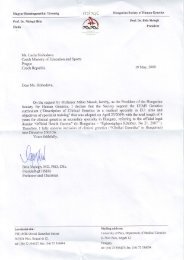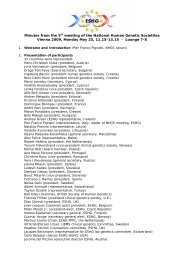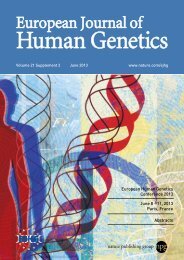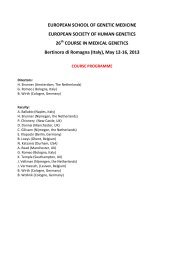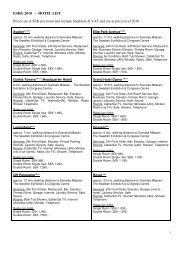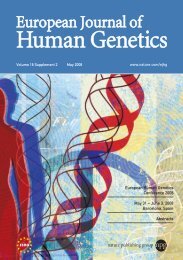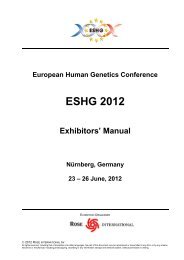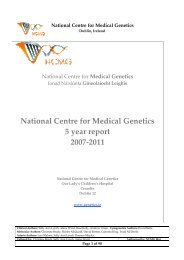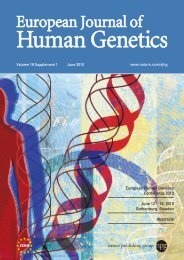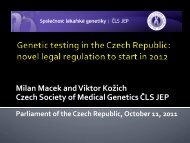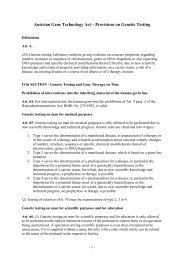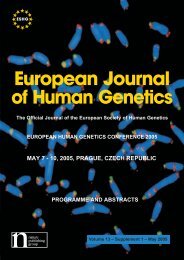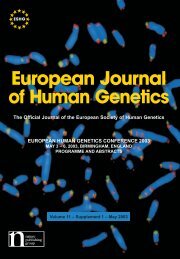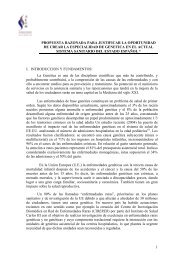2009 Vienna - European Society of Human Genetics
2009 Vienna - European Society of Human Genetics
2009 Vienna - European Society of Human Genetics
Create successful ePaper yourself
Turn your PDF publications into a flip-book with our unique Google optimized e-Paper software.
Complex traits and polygenic disorders<br />
using HBAT. AVPR1A alleles and haplotypes were also associated with<br />
composing (p=0.0351), improvising (p=0.0364) and arranging music<br />
(p=0.0334). Serotonin transporter gene (SLC6A4: promoter region 5-<br />
HTTLPR) was highly associated with COMB (p=0.0084). The results<br />
suggest that the neurobiology <strong>of</strong> music perception and production is<br />
related to the pathways affecting intrinsic attachment behavior important<br />
in evolution.<br />
P09.084<br />
No association <strong>of</strong> oestrogen receptor gene polymorphisms with<br />
myasthenia gravis<br />
Z. Pal 1,2 , A. Gál 1 , V. Reményi 1 , K. Pentelényi 1 , M. J. Molnár 1 ;<br />
1 Clinical and Research Centre for Molecular Neurology, Budapest, Hungary,<br />
2 Department <strong>of</strong> <strong>Genetics</strong> Cell- and Immunobiology, Budapest, Hungary.<br />
Objective: Myasthenia Gravis (MG) is an autoimmune disease that effects<br />
women more <strong>of</strong>ten than men, implying that sex hormones may<br />
play a role in its pathogenesis. Our aim was to investigate the possible<br />
role <strong>of</strong> oestrogene in the pathomechanism <strong>of</strong> MG by elavulating the<br />
association <strong>of</strong> oestrogene receptor (OR) polymorphisms in MG.<br />
Methods: PvuII and XbaI restriction fragment polymorphisms <strong>of</strong> the<br />
OR gene were analyzed in 33 male and 130 female MG patients and<br />
40 male and 134 female healthy controls. The distribution <strong>of</strong> OR genotypes<br />
was compared between the MG patients and the healthy control<br />
group. MG patients were divided into groups according to their OR<br />
genotypes, then their AchR antibody status and age <strong>of</strong> onset and were<br />
compared between the groups.<br />
Results: The OR genotype frequency <strong>of</strong> distribution did not show any<br />
significant differences either between male MG patients and male controls<br />
or female patients and female controls. No association was found<br />
between the OR status and the age <strong>of</strong> onset or AchR antibody positivity<br />
in either <strong>of</strong> the genders.<br />
Conclusion: Though a larger patient sample is needed, our results<br />
suggest, that OR status does not influence MG age <strong>of</strong> onset or AchR<br />
antibody seropositivity.<br />
P09.085<br />
Association <strong>of</strong> the sPiNK5 gene genotypes and haplotypes with<br />
nasal polyposis<br />
F. Belpinati 1 , C. Bombieri 1 , G. Malerba 1 , S. Gambardella 2 , M. D’Apice 2 , C. Corradini<br />
3 , G. Novelli 2 , P. Pignatti 1 ;<br />
1 Section <strong>of</strong> Biology and Genetic, University <strong>of</strong> Verona, Verona, Italy, 2 Department<br />
<strong>of</strong> Biopathology, and Diagnostic Imaging, Tor Vergata University, Rome,<br />
Italy, 3 Department <strong>of</strong> Otolaryngology, Catholic University <strong>of</strong> Sacred Heart,<br />
Rome, Italy.<br />
Nasal polyps (NP) are lesions that emanate from nasal mucosa or<br />
paranasal sinuses, caused by inflammation, related to dysregulation<br />
<strong>of</strong> epithelial cell proliferation. NP incidence is higher in cystic fibrosis<br />
(CF) patients than in general population (35-45% vs 1-4%) and is<br />
one <strong>of</strong> the major otolaryngological CF manifestations, but no particular<br />
CFTR gene mutation was found associated with NP in CF patients.<br />
In an our previous study the D386N-SNP in SPINK5 gene was found<br />
associated with NP in CF patients.The aim <strong>of</strong> this study was to determine<br />
if SPINK5 variants could modulate the development <strong>of</strong> NP in<br />
CF patients. Five SNPs, representative <strong>of</strong> SPINK5 LD blocks, were<br />
selected and analysed in 4 groups <strong>of</strong> subjects: 79 nonCF subjects<br />
with NP and 39 CF patients with NP, 104 CF patients without NP and<br />
101 controls. All CF patients have two CFTR severe mutations. Allele<br />
and genotype frequency and HW equilibrium were calculated for each<br />
polymorphism. An association analysis between either single SNP or<br />
5 SNPs <strong>of</strong> the SPINK5 gene and the NP was carriedout. Haplotype<br />
analyses were also computed.<br />
A significant association between rs6892205 and NP was found in almost<br />
all the analyses performed (p: 0.005-0.01) while association <strong>of</strong><br />
D386N was limited to CF group only (p=0.001). A preferential association<br />
with NP was also confirmed by the haplotype analysis (p: 0.0015-<br />
0.015). These data support the association <strong>of</strong> SPINK5 gene with NP.<br />
It is possible to suppose for SPINK5 gene a role in the inflammatory<br />
process involved in the pathogenesis <strong>of</strong> NP.<br />
P09.086<br />
maternal mtHFR polymorphisms do not predispose to neural<br />
tube defects in india<br />
K. G. Godbole 1 , T. Gayathri 2 , P. Smitha 2 , S. Ghule 1 , N. Memane 1 , A. Kanitkar 1 ,<br />
G. R. Chandak 2 , N. Oza 3 , J. Sheth 3 , I. Amithkumar 4 , S. Suresh 4 , C. S. Yajnik 1 ;<br />
1 K.E.M. Hospital and Research Center, Pune, India, 2 Center For Cellular and<br />
Molecular Biology, Hyderabad, India, 3 Foundation for Research In <strong>Genetics</strong> and<br />
Endocrinology, Ahmedabad, India, 4 Fetal Care Research Foundation, Chennai,<br />
India.<br />
MTHFR polymorphisms C677T and A1298C are reported to predispose<br />
to neural tube defects (NTDs) in the western world. We studied<br />
the association <strong>of</strong> these SNPs in 175 Indian women who carried fetuses<br />
affected with NTDs and 332 unaffected fetuses (control). We<br />
also measured maternal plasma folate, vitamin B12 and homocysteine<br />
concentrations. Folate deficiency was observed only in 6% <strong>of</strong> mothers<br />
who carried NTD fetuses. There was no association <strong>of</strong> maternal MTH-<br />
FR SNPs with plasma folate, vitamin B12 or homocysteine concentrations<br />
in cases, while in controls; TT genotype at C677T was associated<br />
with significantly higher homocysteine concentrations.<br />
Frequency <strong>of</strong> the risk allele T at the C677T polymorphism was 0.13 in<br />
mothers with NTD fetuses and 0.14 in controls, while that <strong>of</strong> the risk<br />
allele C at the A1298C polymorphism was 0.36 in mothers with NTD<br />
fetuses and 0.47 in controls.<br />
The 677T allele in mothers was not associated with NTDs in the <strong>of</strong>fspring<br />
(p=0.68) while the 1298C allele was more frequent in mothers<br />
who had unaffected <strong>of</strong>fspring (p=0.002). 1298C allele was noted to be<br />
preferentially transmitted from mother to <strong>of</strong>fspring in 75% <strong>of</strong> cases and<br />
80% <strong>of</strong> controls, while 677T allele was preferentially transmitted from<br />
mother to <strong>of</strong>fspring in 60% <strong>of</strong> cases and 56% <strong>of</strong> controls. There was<br />
no significant association between the above MTHFR polymorphisms<br />
and NTDs in the <strong>of</strong>fspring.<br />
Our results suggest that the MTHFR polymorphisms which predispose<br />
to NTDs in the western populations have limited contribution to the<br />
etiology <strong>of</strong> NTDs in India.<br />
P09.087<br />
the common MTHFR c677t and A1298c variants are not<br />
associated with the risk <strong>of</strong> non-syndromic cleft lip/palate in<br />
northern Venezuela<br />
M. A. Sözen 1,2 , M. M. Tolarova 3 , R. A. Spritz 2 ;<br />
1 Afyon Kocatepe University School <strong>of</strong> Medicine, Afyonkarahisar, Turkey, 2 University<br />
<strong>of</strong> Colorado Denver <strong>Human</strong> Medical <strong>Genetics</strong> Program, Aurora, CO,<br />
United States, 3 University <strong>of</strong> the Pacific Department <strong>of</strong> Orthodontics, San Francisco,<br />
CA, United States.<br />
Non-syndromic cleft lip with/without palate (nsCL/P) is among the most<br />
common <strong>of</strong> major birth defects, with a frequency <strong>of</strong> 1/500-1/2000 in<br />
most populations and with complex inheritance probably involving multiple<br />
genes and environmental factors. Numerous studies <strong>of</strong> MTHFR,<br />
encoding methylenetetrahydr<strong>of</strong>olate reductase, which catalyzes the<br />
rate-limiting step <strong>of</strong> folic acid biosynthesis, have yielded inconsistent<br />
association <strong>of</strong> two common hypomorphic allelic variants, C677T and<br />
A1298C. Some showed apparent allelic association between MTHFR<br />
polymorphisms and nsCL/P in patients versus controls, and others<br />
finding no or variable association. Other studies have reported association<br />
in mothers <strong>of</strong> patients with nsCL/P. Also, contribution <strong>of</strong> mothers<br />
genotype to the risk <strong>of</strong> nsCL/P has been reported. We have studied<br />
the two common functionally significant MTHFR variants, C677T and<br />
A1298C, in nsCL/P patients (n=179), their mothers (n=168), and population-matched<br />
controls (n=138) from northern Venezuela. We found<br />
no supporting evidence for contribution <strong>of</strong> both the MTHFR C677T and<br />
A1298C polymorphisms to the risk <strong>of</strong> non-syndromic cleft lip with/without<br />
palate in the population studied. Altogether, our data do not support<br />
a causal role <strong>of</strong> either the MTHFR C677T or A1298C polymorphisms<br />
in the pathogenesis <strong>of</strong> non-syndromic cleft lip with/without palate risk<br />
in northern Venezuela.<br />
P09.088<br />
Influence <strong>of</strong> main, interaction and modified effects <strong>of</strong> NET,<br />
ADRA2A and cOmt gene polymorphisms on personality traits in<br />
healthy individuals<br />
A. Kazantseva 1 , G. Faskhutdinova 1 , D. Gaysina 2 , E. Khusnutdinova 1 ;<br />
1 Institute <strong>of</strong> Biochemistry and <strong>Genetics</strong> Ufa Scientific Center <strong>of</strong> Russian Academy<br />
<strong>of</strong> Sciencies, Ufa, Russian Federation, 2 MRC Unit for Lifelong Health and



